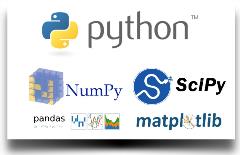Overview of Python for Engineering Programming

Instructed by Dr. John Peng Ho, Boeing Designated Expert on engineering software development
✓ The essential overview of Python for engineering programming, this course was taught for many years exclusively to Boeing employees and is now available to the public.
✓ All students will receive an AIAA Certificate of Completion at the end of the course
OVERVIEW
Learning programming languages is overrated. Learning programming is underrated.
Proficient programming takes more than familiarity with the syntax of any programming language. One needs awareness of existing standard and third-party libraries to avoid re-implementing the “wheel.” Another vital skill is the art of posing problems in ways to exploit the features and capabilities of the language. This last aspect of programming is rarely covered in courses or books.
In this popular course, taught for years at Boeing by the instructor, the Python programming language and its rich ecosystem are introduced. It will focus on engineering applications with practice examples of implementing elegant and efficient algorithms.
Students will be required to use a computer for the class with the provided Anaconda Python Distribution (www.anaconda.com) loaded onto it.
LEARNING OBJECTIVES
- Understand essential concepts to use Python effectively
- Understand the NumPy add-on library and its practical applications to numerical computations
- Introductions to libraries valuable for aerospace engineering applications
- Accessing documentation
- Software quality assurance and documentation generation
AUDIENCE: This course is intended for any engineer, scientist, researcher, or manager with programming needs and/or interests.
TESTIMONIALS:
"This class is filled with extremely helpful information. The exceptionally well prepared course materials were a huge benefit."
"I thought the class was great. I really liked the examples of Propulsion issues that were resolved using Python scripts, and the instructor had a very thorough knowledge of the subject matter."
"The class covered a wide range of content that went over just about everything someone would need to know to make a helpful python program."
"The example codes are very easy to follow and a fantastic resource to catch up on when needed. Perfect notes!"
"Being built on Jupyter was amazing to set up the examples as well as challenge the students with interpretations, mods, and spin-offs. It was a great way to learn. And the way Dr. Ho built up his lessons and examples built concepts layered as nominal, sufficient, and complex solutions. So that you could learn from each level. It was an overall great experience."
"Great professor, great course!"
COURSE INFORMATION
Type of Course: Instructor-Led Short Course
Course Level: Fundamentals
Course Length: 3 days
AIAA CEU's available: Yes
This course is also available on-demand. Register here.
Course Outline
- Python native data types
- Python syntax
- Loops
- Branching
- Exceptions
- Packages and Modules
- Name spaces
- Examples and applications
NumPy and matplotlib Libraries
- NumbPy add-on
- matplotlib
- Examples and applications
Survey of other libraries useful for aerospace engineering applications such as:
- The Jupyter Notebook environment.
- The matplotlib plotting package.
- The standard libraries, in particular Regular expression.
- The scientific/engineering routines in SciPy.
- The Pandas data analytics package.
- Integration with other languages.
AIAA Training Links
For information, group discounts,
and private course pricing, contact:
Lisa Le, Education Specialist (lisal@aiaa.org)
